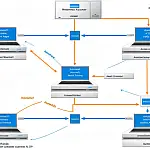SEO Strategy - Search Engine Optimization Tips in 2024Creating a great website is about more than just having pretty designs - it's about making your website perform well on search engines.
This article is part of a series of articles. Please use the links below to navigate between the articles.
- SEO Strategy - Search Engine Optimization Tips in 2024
- A Guide to the Robots.txt Exclusion Protocol
- What Are XML Sitemaps and Why Do You Need One?
- How to Use Google Search Central (formerly Google Webmaster Tools)
- Google Analytics for Tracking Website Visitor Statistics
- How to Start Earning Money with Google Adsense in 2024
- Website Loading Times Are Vital - How to Improve Your Performance
- How To Improve Website Speed By Enabling GZip Compression
- How to Leverage Google Trends for Effective Keyword Research
- Top 8 Best Free Search Engine Optimization Websites & Tools
What is SEO and Why is it Important?
Search Engine Optimization (SEO) is the process of improving the online visibility of a website or a web page in web search engine results.
Correct search engine optimization for blog posts gives them a higher chance of being ranked higher in the search engine results, which means a higher potential for more traffic to your blog. If you make money from your blog from AdSense or similar programs, it can also mean an increase in your income.
By following these pro blogging seo tips, you will increase your chances of being ranked higher in search engines.
16 Simple SEO Tips to Boost Your Rankings
Please remember that there is no such thing as an SEO "holy grail". Every site is different and will have its SEO strategy. Search Engine Optimization techniques that work well on one site may not work at all, or even have an adverse effect, on a completely different site.
Search Engine Optimization is a time consuming process which must be reviewed regularly, it is not a task that's done once and left alone. Just because you are number one in Google now, does not mean that you will be next month! Your competitors will undoubtedly be trying to knock you off the top spot.
Set Well-Defined Goals for your SEO Strategy
What are your main objectives for search engine optimisation? How will you measure the success or failure of your SEO strategy? These are two very important questions that need to be answered before you start the optimisation process.
When I ask people what they want from SEO they often say "Get to number 1 on Google" or "I want more visitors". When I sit down and talk to them, they realise that it's not about the number of visitors to the site, it's about the number of Quality visitors who buy things, so their actual goal is to increase their conversion rate.
When defining your goals, make them realistic and start small. Setting a goal of reaching number 1 in a week isn't going to happen unless you are working in a very small niche market, promoting something very obscure AND are very lucky. Don't expect to increase conversions by 1000% in a month, aim for 5% increase over a couple of months. SEO is a slow progress and you are not going to see immediate overnight gains.
That being said, let's look at a few key SEO tips and how they can help increase your rankings.
Pay Attention to Your Core Web Vitals
According to Google, core web vitals became a ranking factor in 2021. Core web vitals are a set of three specific web page experience metrics that Google considers super important. These are Loading, Interactivity and Visual Stability.
The exact steps you take to improve your core web vitals depend on your site. However, the tools and techniques can be applied to almost any site. First, open the Google Search Console and click on "Core Web Vitals".

What you want to see is that there are no pages listed under Poor or Needs Improvement. You can drill down into the report to see individual pages which need work and also see what is causing problems on the page. There could be any number of issues preventing a page from being "Good" however some of the most common include poor performance and long load times, a large number of requests (combine and minify scripts and styles), mobile tap targets too small and page size greater than the viewport.
Google Passage Ranking
In 2020 Google announced a new search technology called "Passages". Passages allow Google to rank specific, relevant passages from a specific page. Not just the page itself. So instead of Google only taking into account the relevancy of the whole page, they now also evaluate the relevancy of a specific section of that page.
Backlinks, on-page SEO, UX signals, and Google's other page-level ranking factors will still apply. The only difference is that a single page now has more chances to rank. That is, assuming the page is optimized and organized.
This means your content needs to be divided up into dedicated sections using headings which we will cover shortly.
Domain Authority
Domain Authority used to be all about links. The more people link to you the more authority you have. Not anymore. Google also evaluates your site based on Expertise, Authoritativeness, and Trustworthiness (EAT).
If you hire random freelancers to write your content, you're in trouble. That's because Google wants to feature content that's written by legit experts in their field. They even go as far as to say that medical content needs to be written by healthcare professionals.
Google probably focuses on off-site signals to figure out your site's EAT. This could come from off-site mentions. Specifically, mentions from other authorities in your field.
The guidelines also point out:
We expect most websites to have some information about who (e.g., what individual, company, business, foundation, etc.) is responsible for the website and who created the MC, as well as some contact information unless there is a good reason for anonymity.Google Quality Rater Guidelines
This means having:
- Thorough about page
- Easy to find contact page
- References and external links to sources
- Privacy policy and terms of service
- Author bylines on every article
Optimise Key Phrases
It used to be popular to try and rank well for single keywords, however, there is so much competition on the web now, it will be extremely difficult to get a good ranking for singular keywords such as "photography" or "astronomy". Now it is becoming increasingly popular to target niche markets with phrases such as "urban wildlife photography" or "amateur astronomy in England" which are more specific to your content, thus driving more targeted, quality visitors. You can still use keywords; just don't rely on them to bring in quality traffic.
The keywords meta tag is pretty much dead now, so you don't need to stuff keywords into the header, just select one word or phrase and optimize your content for it. This includes setting title tags, image alt tags, links and of course quality content.
When deciding on keywords and phrases, avoid using industry-specific jargon. Stick to simple and clear, "natural language" instead.
You can research different keywords using Google AdWords Keyword Tool or Google Trends. These tools can help discover new keywords and phrases that you can target combinations of keywords that work well together. You can determine your niche phrase, or discover new keywords you haven't even thought of before.
Search Engine Optimised Content
To gain higher rankings, you need to have good quality original content, with 1000 - 1500 words. Duplicate content is plagiarism and as such, it is heavily penalised by search engines, especially Google with the latest Panda update. This is a trend which hopefully is targeting more and more auto blogs (automated blogging/website scrapers) where content is scraped from genuine websites and used to create spam blogs and phishing sites.
Make sure that your content is clear, concise and to the point and primarily written for humans, not search engines. Don't deviate or go off on a tangent, as it will distract your readers. Spell-check and proofread your copy; otherwise, you will lose online credibility.
You should use all of your keywords and key phrases, but try and keep the keyword density around 3-5%. Too low and it won't get ranked for that phrase, too high and you'll be penalised for "keyword stuffing". Page features such as headers, navigation and footers, should not be included as web copy text.
Content such as images cannot be indexed by Google, so try to avoid using images in place of content, especially when replacing heading text with fancy images. When you do use images, make sure that you utilise the alt and title tags to describe the image.
Post Content Length and SEO
SEO and content marketers are always trying to figure out what it takes to drive their content to the top of search results. One frequently talked about characteristic of content is word count, specifically what length gives their content the best odds of reaching the top of the search results.
Unfortunately, there is no set rule here, the ideal length of the content is going to vary by industry and region. Just remember to always focus on quality over quantity, a long post full of garbage will not rank as well as a shorter post of quality content. Adding to much padding and "fluff" to meet a specific word count is likely to hurt more than a short post which provides all the useful information the visitor required.
Use H1, H2 and H3 Heading Tags for SEO
The purpose of heading tags is to split the content into a reader-friendly format. Splitting content by using headings enables the reader to follow the flow of the article and understand it better.
There are 6 heading styles to use, and they should be used in a hierarchy.
The H1 and H2 heading tags will be your web page's main points of focus. They are the first things that users will notice about your page and hence have to be appropriate.
There should be only one H1 tag on the page, this is recommended to contain the article or page title.
The content is split into sections using H2 tags, and each section is further split using H3 tags if required. H4 can also be used in an H3, however, you may wish to look at how your article is structured if you need more than 3 headings.
You shouldn't use an H4 tag after an H2 tag without an H3 as this breaks the hierarchy structure.
Make use of Alt and Title Tags on Images
The alt and title attributes of an image are used to describe the image in a text format. The title attribute is shown in a popup when the mouse hovers over an image, and the alt text is used when the image is not available, in screen readers, text-only browsers and some search engine crawlers.
Every image should have an alt text. This is not just for SEO purposes but also to make the page accessible to blind and visually impaired people. A title attribute is not required. It can be useful but in most cases, leaving it out shouldn't be much of an issue. These attributes can be used to add keyphrases to your page, but don't stuff keywords in. The goal is to describe the image.
Google Image search is becoming a popular tool for finding pictures, so if you have a lot of images on your website (product images or photography for example) it makes sense to try and cash in on this source of traffic.
Images and anchor links can (and should) have alt and title tags. The alt tag should contain an alternate representation of the image should the image not load, while the title tag should contain a description of the link or image. Search engines look at these tags to determine the relevance of the link or the content of the image.
<img src="image1.jpg" alt="Picture of a Dog" title="A photo of my pet dog Wolfie sat in the garden" /> Always use natural language descriptions, not just a keyword list. If you have a lot of images on the page try not to make all the title tags the same.
Interlink your Content When Appropriate for Better SEO
Internal linking is vital for your website structure, not only for SEO purposes but also to help your readers find related content.
An internal link connects one page of a website to a different page on the same website.
Within your content, you should link to relevant content in a way that is natural to the reader. Using natural links that match the context of the content, your readers will be more likely to click on that link.
Good internal linking provides a boost to visitor engagement and SEO so it's a win-win. Just don't go overboard and link every other sentence. Only link when it is natural to do so.
Are Header and Meta Tags Still Relivant for SEO?
Meta tags are descriptive elements inside a web page and (used to be) used to provide search engines with information about the website. Meta tags are contained within the header structure of the HTML document together with the dedicated title tag.
Meta tags cover, among other items, a page description and keywords. There is much debate about the usefulness of meta tags in today's advanced search algorithms, but it certainly won't hurt to use them.
Meta Keywords should be kept to a maximum of 15-20, but do not overdo it - only use keywords and phrases that appear on that page and don't go looking for every synonym in the thesaurus.
Meta Description should be kept to a maximum of 160 characters; any more will be ignored or truncated in the listings. The description should describe what the visitor will find on the page and combined with the title, compel the user to visit your site. Google and most other search engines will typically extract a segment of text based on the search query, but it doesn't hurt to still add a descriptive tag.

The Title Tag is however very important as it will be seen at the top of a search engine listing (see above) as well as in the visitor's web browser window. Page titles should be relevant to the content on the page, and unique to the site.
Having strong, relevant, clickable titles can have a major impact on rankings, visitor numbers and conversions, and for this reason, it is probably one of the, if not the, most important factors when considering on-page SEO.
URL Permalink Structure
Permalink is a term used to identify the URL of a web page. While a URL can change, it is recommended that a permalink does not change, hence the name permanent link. Permalinks should be structured in a way which can include keywords and information about the content, but also not too long. Many CMS utilise "ugly" permalinks by default, for example mydomain.com/?id=3345.
This is considered ugly and bad practice for several reasons.
- It gives away information about the potential back-end system (internal information disclosure) as well as opening up the door to parameter tampering.
- The link means nothing to anyone by itself, it does not indicate the type of page or the page content.
- Search Engines rank keywords in the URL fairly highly, so there is a missed opportunity for SEO points.
A good permalink structure would contain the keywords from the post title. You should exclude common words such as "a", "and", "the" etc. Most CMS systems can generate "clean" URLs or have an extension.
An example of a clean URL would be mydomain.com/fantastic-seo-ideas-blogs/ which immediately shows that the page is about SEO for blogs and contains some all-important SEO points.
Pick your permalink structure wisely. Don't change your permalink structure for the sake of it.
Which is better for SEO, Relative or Absolute URLs?
A question often asked is which is better for SEO, using relative or absolute URLs when adding links to web pages and blog posts? There are many different reasons why your website may have duplicate content issues. and with the recent requirement for adding HTTPS, this is another configuration which may not be optimal for your site.
You see, Google views different versions of a web page address and different server configurations as separate websites. For example, Google sees http://mywebsite.com as a separate site from https://mywebsite.com. While this won't get penalised for not having proper redirects in place, it will make it harder for Google to work out which site is the "true" site, and it potentially spreads out the "link juice".
By itself this is not a major problem, just make sure to redirect all non-HTTPS traffic to the HTTPS version and Google will detect this and all will be fine.
Page Speed and Performance
In the last year or so Google has been putting more emphasis on page loading speed and site performance. While this created a lot of buzz on the internet when it was announced, page loading speed has always been important. How many websites have you visited where the page just takes too long to load - either through overuse of images or adverts? The natural course of action is to go back and try a different site as a slow page is a bad experience. For this reason, page speed is now a ranking factor and slow-loading pages will be marked down.
Research by Google showed that on average, visitors will leave a website if it does not load within 3 seconds. For this reason, Google gives preferential treatment to websites that load quickly.
You can test and optimise your page speed with the use of two add-ons for Firefox. Google has released an add-on for the popular Firebug add-on for Firefox. If you haven't already, you will need to download and install Firefox, Firebug and Google Page Speed.
There are many reasons why websites load slowly, from low-cost servers, poor web programming, unoptimised images and overuse of embedded media.
You can check your web pages load speed using the Google Page Speed Analysis tool or the excellent GTmetrix page speed tool .
Get Connected with your Audience
Social media websites are rapidly becoming an increasingly important factor for search engine optimization, as search engines are utilising the recommendations of users of social networks such as Facebook, Twitter, and Google+ to rank pages in the search engine result pages. The reasoning is that when a web page is shared or "liked" by a user on a social network, it counts as a "vote" for that webpage's quality. Thus, search engines can use such votes accordingly to properly rank websites in search engine results pages.

Read Google Webmaster Guidelines
Following these guidelines will help Google find, index, and rank your site. Even if you choose not to implement any of these suggestions, we strongly encourage you to pay very close attention to the "Quality Guidelines," which outline some of the illicit practices that may lead to a site being removed entirely from the Google index or otherwise penalised.
Check out the official Google Search Engine Optimization Starter Guide for a free eBook that lists some best practices that teams within Google and external webmasters alike can follow that could improve their sites' crawl ability and indexing.
Install an SEO Plugin
I've talked about various SEO plugins in a previous post, and again in my WordPress SEO plugins for 2018 article. In the 10 years between posts, not a lot has changed. Yoast SEO plugin has remained consistently the best solution for WordPress users, as has a few others.
Build Your Site for Readers, NOT Search Engines
The most important SEO advice I can offer is that your site should be designed and built and content is written for your visitors and readers, NOT search engines. If a website looks over-optimised or is stuffed with unnatural links and packed full of keywords with little real content then you will likely attract a penalty from the search engines. This holds equally true for plagiarism, which can get your site blocked in Google results. Copy and Paste other articles from the web without permission is theft and will be dealt with harshly.
Redirect WWW to non-WWW
The solution to this is to correctly redirect WWW to non-WWW, (or vice versa if that is your preference). In Apache, it is as easy as adding one of these rules to your .htaccess file:
Redirect WWW to non-WWW in Apache
RewriteEngine On
RewriteBase /
RewriteCond %{HTTP_HOST} ^www.(.*)$ [NC]
RewriteRule ^(.*)$ http://%1/$1 [R=301,L] Redirect non-WWW to WWW in Apache
RewriteEngine On
RewriteBase /
RewriteCond %{HTTP_HOST} !^www. [NC]
RewriteRule ^(.*)$ http://www.%{HTTP_HOST}/$1 [R=301,L] Redirect HTTP to HTTPS
The next solution is to redirect all traffic to HTTPS (or HTTP if you prefer). Again, just place these rules in your .htaccess. If you already have RewriteEngine and RewriteBase in the rules you don't need to add them again.
Redirect HTTP to HTTPS in Apache
RewriteEngine On
RewriteCond %{SERVER_PORT} 80
RewriteRule ^(.*)$ https://%{HTTP_HOST}/$1 [R=301,L] Redirect HTTPS to HTTP in Apache
RewriteEngine On
RewriteCond %{HTTPS} on
RewriteRule (.*) http://%{HTTP_HOST}/$1 [R=301,L] 









